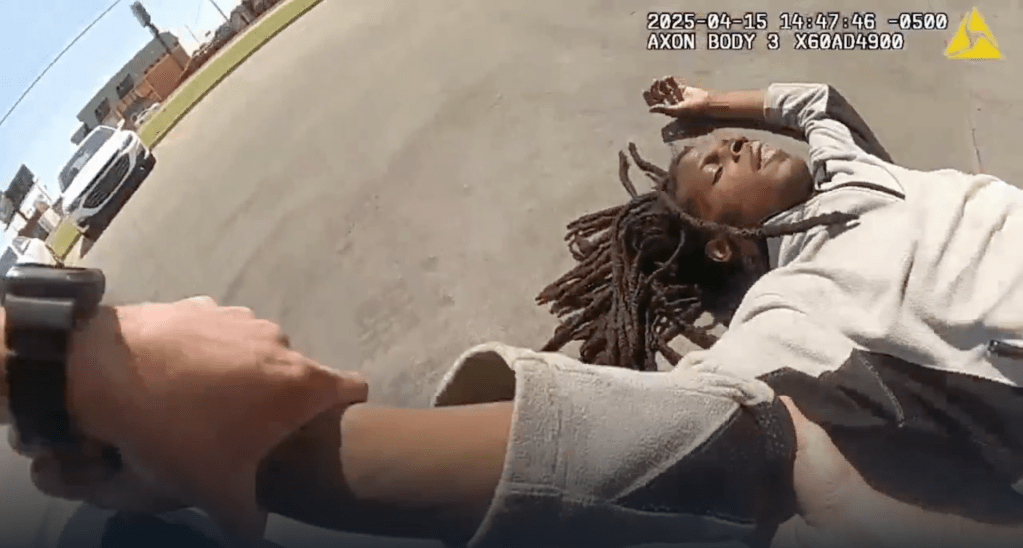Tulsa Police Cruiser Runs Over Black Accused Jaywalker During Stop Where Cops Were Fishing For Larger Crimes

An incident involving police officers in Tulsa, Oklahoma, and a Black alleged jaywalker resulted in the civilian being injured by a police cruiser that one officer, apparently, failed to put in park before exiting.
Also, it arguably looks like it could be a case of racial profiling gone wrong.
Bodycam footage obtained by KJRH shows the moment a Tulsa police officer rolled up on Kemonte Hampton in a Quick Trip parking lot on April 15. Officers pin Hampton to the ground when the cruiser rolls backward over the suspect.
“Y’all just ran me over, bro,” Hampton is heard shouting as cops continue to pin him down.
Police Capt. Richard Meulenberg told KWGS that an officer attempted to stop Hampton for failing to use a crosswalk when crossing the street. Meulenberg identified the cop as Officer Caleb Stroble, who he said tried to get Hampton to come over to his vehicle, but Hampton walked away, prompting him to chase the jaywalking suspect in and out of a hotel in the area and around the QuikTrip.
Meulenberg didn’t identify the officer whose cruiser ran over Hampton, but he did offer some light cop-splaining as to what happened.
“Another officer is responding to the scene, pulls up there to assist. He believes he parks his car, puts his car in park. And while he was back assisting, his car was actually not in park; it was in reverse. So it actually backs into the officer and the suspect,” Meulenberg said.
Meulenberg also noted that Kemonte Hampton was taken to the hospital and treated for his injuries, and that a panel within the Tulsa Police Department will determine this month if the unnamed officer’s actions should be internally reviewed.
Meulenberg also offered another interesting tidbit of information that might shed a little light on why a jaywalking incident resulted in such an aggressive police response in the first place.
From KWGS:
Meulenberg said Hampton’s initial police stop stemmed from increased calls for more policing in the area after an uptick in violent and drug crimes. This included jaywalking enforcement, he said.
Meulenberg said Tulsa police typically issue a citation to jaywalkers at most unless they have outstanding warrants.
“(Hampton) wasn’t using the crosswalk, so he was jaywalking. So we have probable cause to stop and talk to that person,” he said.
“Is it a minor infraction? Yes, absolutely. But it comes on the demands of the community saying, ‘hey, we have these major crimes out here, do something,’” Meulenberg told KJRH. “Leading up to [the incident], for months we had hundreds of calls to that area.”
And there it is…
Anyone who is familiar with, well, being Black in America knows the common cop tactic of stopping Black people over minor infractions in order to probe around for a reason to arrest them. We also know how cops have justified that tactic as an effort to reduce crime.
These tactics are also reminiscent of “stop-and-frisk” in New York City, a practice that disproportionately targeted Black and Latino men and was justified because, as former NYC Mayor Michael Bloomberg put it, minority neighborhoods are “where the crime is.” Never mind the fact that data showed around 80% of the Black and Latino citizens stopped between 2014 and 2017 were found not to have committed any infractions, and it also consistently show that white people are more likely than Black people to be in possession of drugs, weapons or other contraband when stopped by cops, yet Black people arrested at three times the rates of white people.
Make no mistake: the police practice of stopping people for minor offenses in order to go on probable cause fishing expeditions for larger crimes is just stop-and-frisk with a few more steps. It would be interesting to see what the data is on who is getting stopped more often for jaywalking in Tulsa, a city that is around 70% white and just over 10% Black, according to the U.S. Census Bureau.
In the end, Kemonte Hampton was charged with misdemeanor improper walking and obstructing an officer, indicating that his stop didn’t produce a reason for more serious charges, such as drugs, weapons or warrants.
Just sayin’.
SEE ALSO:

